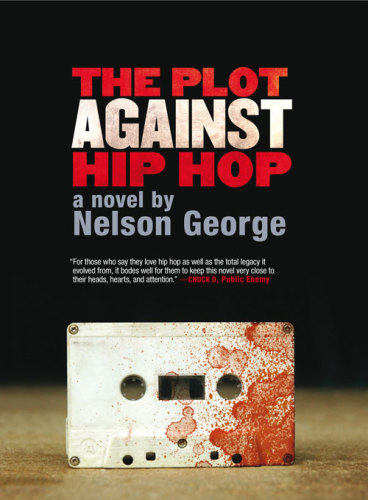
The Plot Against Hip Hop
D Hunter Mystery Series, Book 2
کتاب های مرتبط
- اطلاعات
- نقد و بررسی
- دیدگاه کاربران
نقد و بررسی

September 5, 2011
George (City Kid), a prolific cultural critic, attempts to squeeze 40 years of hip-hop and urban culture into this uneven noir, which centers on the stabbing of Dwayne Robinson, a middle-aged music critic and black intellectual with a career similar to that of the author’s. Robinson dies clutching a bloodied cassette tape at the door to his pal D’s downtown Manhattan office. When the authorities quickly dismiss the murder as just another gang initiation, D takes the investigation into his own hands, discovering bits and pieces of his late friend’s hip-hop conspiracy theory along the way. George embeds the story with cultural references that will resonate with fans of the music (each chapter cleverly takes its name from a relevant rap song), and the real-life East Coast/West Coast feud that led to the deaths of Biggie and Tupac plays a large role in the development of the plot. Unfortunately, that plot can be slow-moving and hard to follow.

October 15, 2011
When his mentor is stabbed to death outside his New York City office, an old-school bodyguard investigates the roots of the hip-hop community's predilection for violence. Some authors know their territory all too well. This might be the case with music critic George (Thriller, 2010, etc.), who mines the hip-hop community for a noir novel that serves equally well as time capsule. It starts with a bang as bodyguard D Hunter protects a rap star at a fundraiser before returning to his office to witness a murder. There, D finds his mentor, journalist Dwayne Robinson, slumped at his door with fatal stab wounds, muttering, "Remix. It's all a remix…Biggie was right….It was all a dream." While D is no Easy Rawlins, George has done the work to flesh out his uneasy detective into a credible character. D is a hard man among the trigger-happy stars of the hip-hop universe, but his fearsome appearance is softened by his underlying terror at being HIV-positive. Doing his violent digging, D discovers that Robinson was a contributor to a marketing memorandum on how not only to cash in on hip-hop culture, but how to control it for profit and cultural sabotage. "So it didn't take much skullduggery to control hip hop," D discovers in a lost notebook. "It was just a matter of helping the most volatile people in on the game rise to positions of prominence. Eventually they'd sabotage themselves and, in so doing, bring down scores of others." George is an ace at interlacing the real dramas of the world—the crack epidemic and the government's part in it, not to mention the pivotal murders of Tupac Shakur and Biggie Smalls. But the book's slim length and flyweight depth could make it an artifact of this particular zeitgeist in American history. Playas and haters and celebrity cameos fuel a novel that is wickedly entertaining while being frozen in time.
(COPYRIGHT (2011) KIRKUS REVIEWS/NIELSEN BUSINESS MEDIA, INC. ALL RIGHTS RESERVED.)

October 1, 2011
D Hunter runs a business providing security for hip-hop events like Jay-Z promotions and BET awards shows. When longtime friend and music critic Dwayne Robinson stumbles to D's office door and dies from stab wounds, the security boss vows to hunt down the murderer. What D uncovers are layers of intrigue and skullduggery stemming from an expose involving Robinson. Did a massive sellout of artists' talent veer outrageous profits to Corporate America's bank accounts? D's sense of honor and nostalgic feelings for hip-hop's roots won't let him rest. With strong connections to the blueprint of the noble loner driven to uncover the truth established by Raymond Chandler, Dashiell Hammet, and Robert B. Parker, this hard-boiled tale is jazzed up with authentic street slang and name-dropping (Biggie, Mary J. Blige, Lil Wayne, and Chuck D). Instead of a rant by an angry old-school dude remembering the way things used to be, George's tightly packaged mystery pivots on a believable conspiracy. VERDICT The author of Hip Hop America certainly has the chops to write about hip-hop culture, and his street cred shines in his descriptions of Harlem and Brownsville's mean streets. Although this is more of a procedural crime novel, street lit fans will migrate to George's solid urban story.--Rollie Welch, Cleveland P.L.
Copyright 2011 Library Journal, LLC Used with permission.

November 1, 2011
D Hunter, owner of a successful security company, grew up on the tough New York streets of Brownsville, but he's knocked off his game when influential hip-hop music critic Dwayne Robinson dies in his arms after being shot. The New York cops categorize the killing as an unsolvable gang shooting, but D doesn't believe it. As D reluctantly investigates the death of his friend, he suspects Robinson may have been working on a story that precipitated his death. An old cassette tape, a missing manuscript, and cryptic threats warn D off the case. But veiled threats inspire him to dig deeper into hip-hop's violent underbelly. Modern hip-hop is corporate as much as it's street, meaning big money may be at stake. George is a well-known, respected hip-hop chronicler (e.g., Hip Hop America, 1998) and executive producer of VH1's Hip Hop Honors broadcast. Now he adds crime fiction to his r'sum' with a carefully plotted crime novel peopled by believable characters and real-life hip-hop personalities.(Reprinted with permission of Booklist, copyright 2011, American Library Association.)

























دیدگاه کاربران